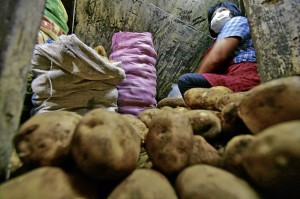DA probes potato disease spread

A WOMAN sorts out sacks filled with Benguet-grown potatoes at the Hangar at Baguio City Public Market. RICHARD BALONGLONG/INQUIRER NORTHERN LUZON
LA TRINIDAD, Benguet—Government plant experts are tracking down Benguet farmers who may have unwittingly bought imported potato seeds that could be infected with a disease.
The Department of Agriculture (DA) raised the alert after receiving reports and complaints from Gov. Nestor Fongwan that Canadian seeds imported and distributed by a local cooperative in April might have carried the potato blackleg (Erwinia carotovora).
Benguet’s agriculture office has been collecting reports of rotten potato plants in many farms, Fongwan said on Thursday.
He said the province was seriously taking these reports, owing to their potential impact on its multimillion-peso vegetable industry. Benguet farms supply most of the salad vegetables, including potatoes, of Metro Manila and other markets in Luzon.
Jesus Aspuria, Baguio superintendent of the Bureau of Plant Industry (BPI) and the local office of the National Crop Research and Development Center, said initial surveys conducted in September confirmed several cases of rotten potato plants.
Article continues after this advertisementThe BPI, however, has yet to conclude that these cases came from imported potatoes. “Blackleg infection is also common in the Philippines,” Aspuria said.
Article continues after this advertisementThe potato blackleg bacteria turn the lower stems of potato plants black as infection turns the plant brittle until it wilts, according to the website, www.gardenorganic.org.uk. Its fact sheet on potato blackleg said that “even certified seeds can contain a blackleg but the disease is unlikely to spread from plant to plant during the life of the crop.”
Aspuria confirmed this detail but said the BPI’s task was to identify the farmers who bought the imported seeds.
“The story about infected potatoes has been circulating [since July] so farmers are likely to be more careful, but there may be farmers who did not plant at first and who may decide to proceed to plant now because of the good weather,” he said.
Farmers still rely on imported seeds because the government can only supply 2.5 tons a hectare of potato seeds, which they grow in Baguio greenhouses, he said.
Potato farms cover 32,000 hectares in the Cordillera.
The imported seeds under investigation cost farmers P70 a kilogram, compared to the seeds that the BPI sells for P25 a kg. In Benguet, 7,000 farmers annually produce an average of 97,834 metric tons of potatoes from a combined 10,967 ha of potato farms, government records showed. The farms are mostly in the towns of Buguias, Mankayan and Atok, all in Benguet, as well as in Bauko, Mt. Province. Vincent Cabreza, Inquirer Northern Luzon